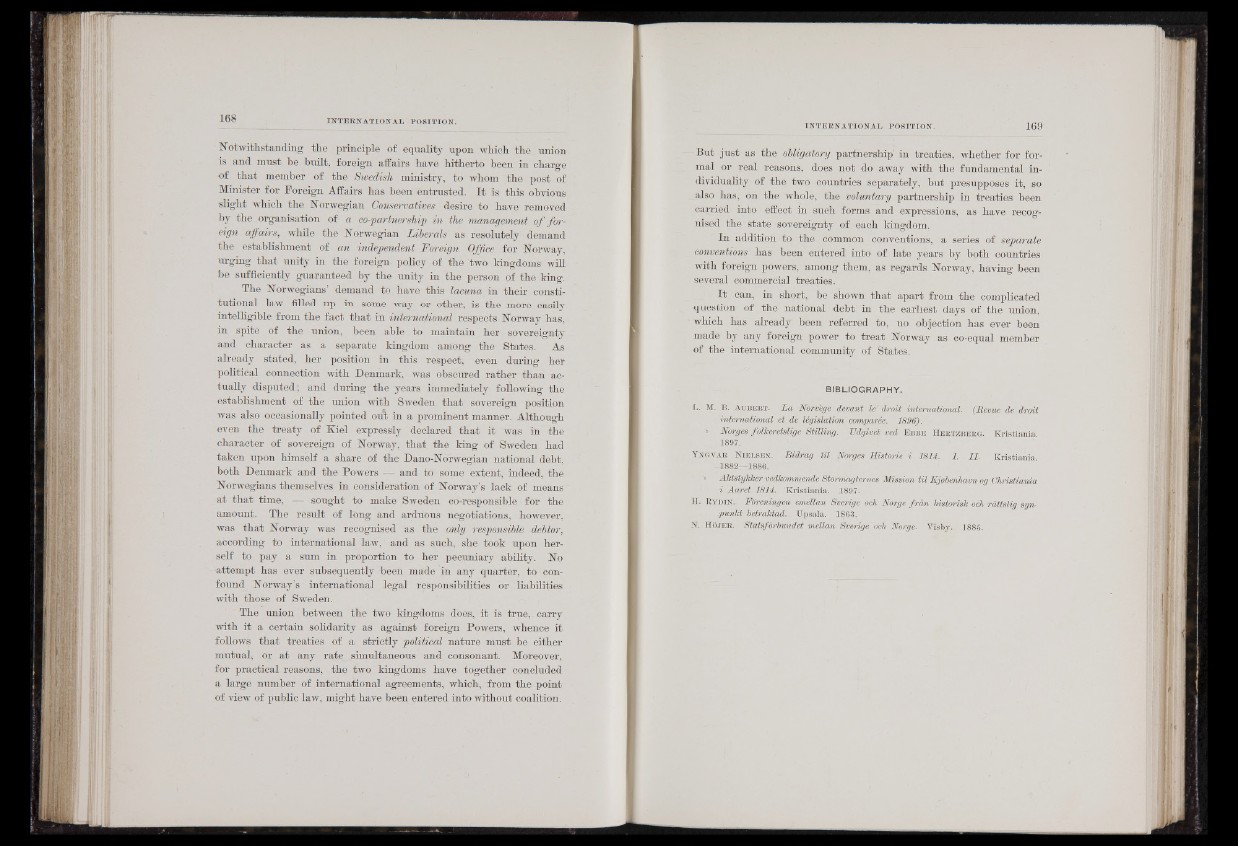
Notwithstanding the principle of equality upon which the. union
is and must be built, foreign affairs have hitherto been in charge
■of that member of the Swedish ministry, to whom the post of
Minister for Foreign Affairs has been entrusted. I t is this obvious
slight which the Norwegian Conservatives desire to have removed
by the organisation of a co-partnership in the management of foreign
affairs, while the Norwegian Liberals as resolutely demand
the establishment of an independent Foreign Office for Norway,
urging that unity in the foreign policy of the two kingdoms will
be sufficiently guaranteed by the unity in the person of the king.
The Norwegians’ demand to have this lacuna in their constitutional
law filled up in some way or other, is the more easily
intelligible from the fact that in international respects Norway has,
in spite of the union, been able to maintain her. sovereignty
and character as a separate kingdom among the States. As
already stated, her position in this respect, even during her
political connection with Denmark, was obscured rather than actually
disputed; and during the years immediately following the
establishment of the union with Sweden that sovereign position
was also occasionally pointed out in a prominent manner. Although
even the treaty of Kiel expressly declared that it was in the”
character of sovereign of Norway, that the king of Sweden had
taken upon himself a share of the Dano-Norwegian national debt,
both Denmark and the Powers — and to some extent, indeed, the
Norwegians themselves in consideration of Norway’s lack of means
at that timefigP-' sought to make Sweden co-responsible for the
amount. The result of long and arduous negotiations, however,
was that Norway was recognised as the only responsible debtor,
according to international law, and as such, she took upon herself
to pay a sum in proportion to her pecuniary ability. No
attempt has ever subsequently been made in any quarter, to confound
Norway’s international legal responsibilities or liabilities
with those of Sweden.
The union between the two kingdoms does, it is true,, carry
with it a certain solidarity as against foreign Powers, whence it
follows that treaties of a strictly political nature must be either
mutual, or at any rate .simultaneous and consonant. Moreover,
for practical reasons, the two kingdoms have together concluded
a large number of international agreements, which, from the point
of view of public law, might have been entered into without coalition.
But just as the obligatory partnership1 in treaties, whether for formal
or real reasons, does not do away with the fundamental individuality
of the two countries separately, but presupposes it, so
_also has, on the whole, the voluntary partnership in treaties been
carried into effect in such forms and expressions, as have recognised
the state sovereignty of each kingdom.
In addition to the common conventions, a series of separate
conventions has been entered into of late years by both countries
with foreign powers, among them, as regards Norway, having been
several commercial treaties.
I t can, in short, be shown that apart from the complicated
question of the national debt in the earliest days of the union,
which has already been referred to, no objection has ever been
made by any foreign power to treat Norway as co-equal member
of the international community of States.
BIBLIOGRAPHY.
■L- M. B. AubeBt. L a Norvège devant le droit international. (Sevue de droit
international et de. législation comparée. 1896).
Norges follceretslige Stilling. Udgivet ved E b b e H e r t z b e r g . Kristiania.
1897.
Yn g v a b Nie l s e n . Bidrag til Norges Historié i 1814. 1. I I . Kristiania.
' —18821^1888.
» Aktstykker vedkommende Stormagtemes Mission til Kj0benhavn og Christiania
i Aaret 1814. Kristiania. 1897.
H. Ry d in . Foreningen emellan Sverige och Norge f r â n historisk och rattstig syn-
.pwnkt betraktad., ÏJpsala. 1863.
N. H ô je r. Statsfôrbmdet mellan SverigtToch Norge. Visby. ^Ï885.